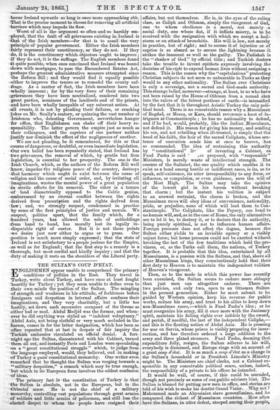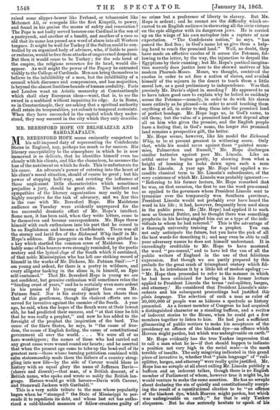THESULTAN'S COUP D'ETAT. E NGLISHMEN appear unable to comprehend the primary
conditions of politics in the East. They travel in Turkey, write about Turkey, and have once at least fought heartily for Turkey; yet they seem unable to define even to their own minds the position of the Sultan. The mingling ef strength and weakness in his attitude, of feebleness before foreigners and despotism in internal affairs confuses their imaginations and they -very charitably, but a little too hastily, set down each successive occupant of the throne as either bad or mad. Abdul Medjid was the former, and when- ever he did anything was styled an " indolent voluptuary." Abdul Aziz, not being slothful or very much secluded in the 3aarem, comes in for the latter designation, which has-been so -often repeated that at last in despair of fair inquiry the 'Turkish embassies circulated an official denial. A fort- might ago the Sultan, discontented with his Cabinet, turned them all out, and instantly Paris and London were speculating on a "great constitutional struggle" which, to judge from the language employed, would, they believed, end in making et' Turkey a quasi constitutional monarchy. One writer even remarked that he thought the Sultan was verging towards a "military despotism," a remark which may be true enough, but which in its European form involves the oddest confusion .of ideas.
The primary fact in the constitution of Turkey is that the Sultan is absolute, not in the European, but in the Oriental sense. He is not the chief of a military monarchy, controlling vast populations through great armies of soldiers and little armies of policemen, and still less the elected despot to whom the people have resigned their affairs, but not themselves. He is, in the eyes of the ruling class, as Caliph and Othman, simply the vicegerent of God, one to whom obedience is a moral, not merely a social duty, one whose fiat, if it inflicts misery, is to be received with the resignation with which we accept a hail- storm or an attack of bronchitis. His will is law, not merely in practice, bat of right ; and to accuse it of injustice or of caprice is as absurd as to accuse the lightning e because it strikes the innocent as well as the guilty. The Padishah is the "shadow of God" by official title ; and Turkish doctors take the trouble to invent epithets expressly involving the doctrine of his right to expend human lives without assigning a reason. This is the reason why the "capitulations" protecting Christian subjects do not seem so unbearable to Turks as they would to any other nationality. The Sultan over Christians is only a sovereign, not a sacred and God-made authority. This strange belief, moreover—strange at least, to us who have not been raised by the House of Othmin from a nomad elan into the rulers of the fairest portions of earth—is intensified by the fact that it is throughout Asiatic Turkey the only poli- tical bond. There is no conceivable reason why a Mussulinan. of Bagdad, or Mecca, or Kars, should reverence a knot of in- triguers at Constantinople; • he has no nationality to defend, and if he had, would, probably, like the Indian Mussulman, not defend it. His reason for giving his money, and sending his son, and not rebelling when ill-treated, is simply that the head of his faith, the heir of the sacred Caliphate, whose sen- tence of execution sends him at once to heaven has so commanded. The idea of restraining this authority by "constitutional." lie' of inventing a Cabinet, as Fund Pasha is said ..ve proposed, with "responsible" Ministers, is merely- waste of intellectual strength. The essence of the Sultanet, the one quality which enables it to exist as a bond among hostile or indifferent races, is its, so to speak, self-existence, its utter irresponsibility to any force, or influence, or compulsion, or -even guidance, save the will of the Most High. The Sultan may take the opinion of the lowest girl in his harem without breaking that charm • but the instant his volition is subject to an avow restraint, the charm is broken, and the Mussulman races will obey ideas of .convenience, nationality, pride, or prejudice, none of which will lead them to Con- stantinople. The Caliphate, like the Papacy, can bend to no human will, and, as in the case of Rome, the only alternatives are to let it be, to destroy it, or to declare that its authority, being purely spiritual, is not to influence human affairs. Foreign pressure does not affect the dogma, because the Sultan either yields to an invisible agency or a visibly unjust force; but home pressure could not be exerted without breaking the last of the few traditions which hold the pro- vinces, or, as the Turks call them, the nations, of Turkey together. It is probable that this idea, entertained by all Mussulmans, is a passion with the Sultans, and that, above all other Mussulman kings, they conscientiously hold that their first duty to Heaven is to maintain the independent volition of Heaven's vicegerent.
Then, as to the mode in which this power has recently been exercised, the Sultan seems to endure more obloquy than just men can altogether endorse. There are two policies, and only two, open to an Ottoman Sultan in the present generation. Either he must submit to be guided by Western opinion, keep his revenue for public works reduce his army, and trust to his allies to keep down non-/ifussulman races,—which is Fired Pasha's idea ; or he must reorganize his army, fill it once more with the danissary spirit, maintain his failing rights over infidels by the sword, and perish, if needful, the last of the independent Caliphs,— and this is the floating notion of Abdul Aziz. He is pressing for war on Servia, whose prince is visibly preparing for insur- rection, and has therefore ordered a large addition to the army and three plated steamers. Fund Pasha, deeming that expenditure folly, resigns, the Sultan adheres to his will, everybody is dismissed, and Europe rings with an account of a great coup d'etat. It is as much a coup d'itat as a change in the Sultan's household or in President Lincoln's Ministry might be. The Ministers are chief clerks, not a Cabinet re- sponsible in any conceivable political sense unless, indeed, the responsibility of a private to his officer be intended. It would be well, of course, if this could be amended, though not precisely as some of our public advisers hint. The Sultan is blamed for putting new men in office, and stories are told of his wish to make his dentist Grand Vizier. Why not ? Mahommed made an Abyssinian slave generalissimo, and he conquered the richest of Mussulman countries. How often. have the Sultans, in utter defeat, stooped among their people, raised some slipper-bearer like Ferhaad, or tobacconist like Mehemet Ali, or renegade like the first Kiuprili, to power, and found in his genius the means of safety and renovation? The Pope is not badly served because one Cardinal is the son of a pastrycook, and another of a bandit, and another of a race so old that its name has passed as a word of abuse into all Western tongues. It might be well for Turkey if the Sultan could be con- trolled by an organized body of advisers, who, if liable to panic or rashness, would be free from attacks of ungoverned despotism. But then it would cease to be Turkey ; for the sole bond of the empire, the religious reverence for its head, would dis- appear. As well might the power of the Papacy be entrusted visibly to the College of Cardinals. Men can bring themselves to believe in the infallibility of a man, but the infallibility of a council which discusses and compromises, and has majorities, is beyond the almost limitless bounds of human credulity. Paris and London want an Asiatic monarchy at Constantinople which shall obey European ideas—want, that is, to use the sword in a scabbard without impairing its edge. As in Rome, so in Constantinople, they are asking that a spiritual authority shall retain its temporalities, yet submit to temporal restraints. When they have succeeded in the capital which they under- stand, they may succeed in the city which they only describe.































 Previous page
Previous page